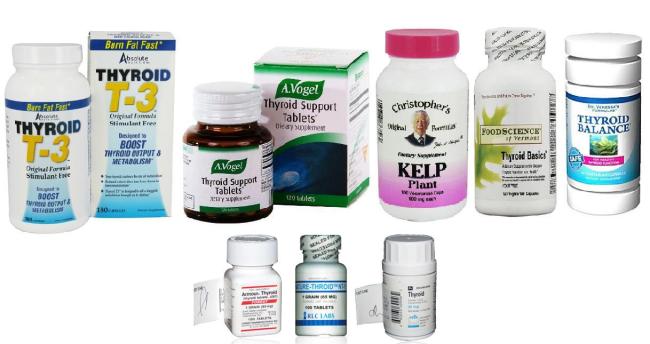Untreated thyroid disease can cause uncomfortable symptoms, but prescription medications can help.
Thyroid Disease: Medications for Hypothyroidism
The goal of medication therapy to treat hypothyroidism is to supply the body with enough of the thyroid hormone it needs to function properly. Since hypothyroidism prevents the thyroid gland from producing enough, a synthetic hormone pill made in a laboratory can be taken each day to supplement the insufficient hormone production.
Synthetic versions of the thyroid hormone thyroxine, or T4, might be referred to as l-thyroxine, levothyroxine sodium, or thyroxine sodium.
Another medication, called Thyrolar (liotrix) contains both T4 and another thyroid hormone, triiodothyronine, or T3, and may better control hypothyroidism in people whose symptoms are not relieved by T4 medication alone.
Desiccated hormones, also called “natural” hormones, were once used to treat hypothyroidism before synthetic medications were developed. These hormones can now be purchased as supplements that contain a powdered form of pig thyroid tissue. While these supplements do contain the same thyroid hormones found in humans, it is difficult to standardize the amount of hormone in each pill. As a result, it’s tough to regulate thyroid hormone levels while taking these supplements. Synthetic medications are now considered more effective than these desiccated hormones, since they are easier to monitor and adjust.
Thyroid Disease: Medications for Hyperthyroidism
Medications can be used to try to control hyperthyroidism as well. The medications prescribed for this purpose are called anti-thyroid medications and include:
- Tapazole (methimazole)
- Propylthiouracil, or PTU
People with hyperthyroidism may also be prescribed a beta blocker — not to treat the thyroid disease, but to manage its symptoms. Hyperthyroidism can cause increased heart rate, tremors, nervousness, and anxiety. Beta blockers that are commonly prescribed to treat high blood pressure, such as Inderal (propranolol), Tenormin (atenolol), and Lopressor (metoprolol), can successfully control these symptoms as well.
Anti-thyroid medications can be very successful in treating hyperthyroidism, particularly Graves’s disease, which is an autoimmune disease. Up to 30 percent of people with Graves’ disease who take anti-thyroid medications long-term (between 12 and 18 months) may find that the symptoms of this thyroid condition disappear over time.
Treatment Options for Hypothyroidism
A common treatment is to replace thyroxine with a specific synthetic thyroid hormone (levothyroxine). This hormone is safe and affordable, but determining the right dosage often takes time. Your metabolic rate has to be returned to normal. Raising it too quickly can causepalpitations and make some medical problems like coronary artery disease and atrial fibrillation worse. Symptoms of thyroid hormone excess are:
- shakiness or tremors
- palpitations
- insomnia
- increased appetite
Diets rich in soy and high fiber can interfere with levothyroxine absorption. Medications and supplements also can reduce absorption. These include:
- calcium supplements
- iron supplements
- cholestyramine
- aluminum hydroxide
